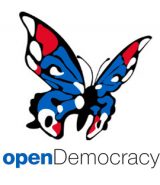
openDemocracy
openDemocracy offers in-depth news analysis and commentary from a pro-Democracy, pro-Human Rights perspective.
openDemocracy is committed to human rights and democracy. We aim to ensure that marginalised views and voices are heard. We believe facilitating argument and understanding across geographical boundaries is vital to preventing injustice.
Beyond and behind the headlines
We won’t tell you what to think. We offer you a spectrum of ideas, from the people who have lived through the events, from those on the ground making a difference, from scholars with expert knowledge. In-depth, independent, inside.
Our writers provide you with the background information you need to challenge the politics of any place. Every day, we publish new articles and opinions.
50.50 – Towards democratic debate
A global debate without the female half of humanity is neither global nor democratic. With this in mind, openDemocracy‘s 50.50 initiative is building a series of editorial projects designed to make openDemocracy a current affairs forum which is written, read and used equally by women and men.
Website: www.opendemocracy.net
Facebook: www.facebook.com/openDemocracy
Twitter: https://twitter.com/opendemocracy
YouTube

Associate's Articles
A large part of the western Left, focused on NATO and the USA, failed to see Russian aggression. Of course, the war on terror needs to be brought into the discussion – but critique of liberal internationalism cannot add up to support for the ‘spheres of interest’ doctrine.
The roll-out of COVID-19 vaccines gives much-needed hope. But if the drug industry keeps being devoted exclusively to profit, inequality and mistrust will cost lives in poorer countries, and eventually also in the wealthy western world.
Poverty or virus?
Lebanon’s uprising despite the pandemic
The corona crisis acts as a double-edged sword for Lebanese protesters: it reinforces the grievances that have fuelled the uprising, but it also provides an opportunity to political elites to bolster their support, offering welfare for political loyalty.
Clapping or caring
Applause as a form of social distancing
Although celebrated as a gesture of solidarity, the act of applauding essential workers is really a form of social distancing from them. It is the fate of heroes that their bodies are being used to climb to the heights of national glory.
A computer is all you need
How Big Tech – especially Digital Health – is eroding the social contract
Big Tech and its applications are often hailed as a way of democratizing healthcare. But who is really benefitting from Big Tech’s increasing involvement in public services such as health? And does a focus on the privacy implications of the Big Tech revolution cause us to overlook its social impacts?
The Conservative victory in the UK election was driven by hatred of a broken political process inflamed by disinformation and media cynicism, argues Adam Ramsay of openDemocracy. Britain’s prime minister made politics awful, then asked people to vote it away.
Another media regime is possible
From the liberal public sphere to the information commons
In response to political pressure, digital platforms are abandoning their laissez-faire approach to content and allying with legacy media to provide ‘reliable’ news and information. But this is the wrong way to create the conditions in which disinformation becomes vulnerable to challenge.
An investigation by openDemocracy into the financing of the Brexit campaign in 2016 has raised far-reaching questions about connections between neoliberal elites, the tech industry and the private intelligence sector. Adam Ramsay, one of the journalists involved, summarises a story vital to understanding how Britain has ended up where it is today.
Earlier this month, Romania’s PSD-led government succeeded in having the country’s leading anti-corruption prosecutor fired, and then launched a violent crackdown on street demonstrations that had been going on for more than 20 months. Roland Clark surveys the fractured state of Romania’s democracy.
Women have been playing a key role in the recent Polish protests. Irma Allen relates their stories and reports that, despite intimidation and social pressure, this time they won’t be silenced.
Don't ignore the Left!
Connections between Europe's radical Left and Russia
It’s not just Europe’s far right parties; the radical Left too has both personal and political connections to the Kremlin, write Péter Krekó and Lóránt Gyori. Moreover, the old “comrade networks” of Soviet times remain active.
In this excerpt from Anthony Barnett’s book project Blimey – it could be BREXIT!, the founder of openDemocracy (UK) argues in favour of the United Kingdom remaining a European Union member state. In the process, he reflects on the changing prospects for a genuinely democratic Europe, and on the role of digital and other new platforms in shaping European debate.
Who speaks for Europe? The UK referendum as a pan-European affair
The UK referendum as a pan-European affair
Intervening in the UK referendum debate is fraught with difficulty for EU actors, writes Andrew Glencross. This is not least because they are largely deprived of their most common rhetorical device: appealing to a normative commitment to European unity for the sake of continental peace.
The Polish boomerang: On Warsaw's adoption of the 'Budapest Model'
On Warsaw's adoption of the 'Budapest Model'
In terms of prompting domestic and foreign concern over the rise of illiberal democracy in the European Union, the new Polish government has almost outdone the Hungarian governments of the past six years. Cas Mudde considers the likelihood of EU sanctions against both Poland and Hungary.
Safeguarding the "grey zone"
For free, open and diverse societies
In an article first published shortly after the 13 November Paris terrorist attacks, investigative journalist Nafeez Ahmed addresses the twisted logic of extremist ideologies; and how to break the continuum of violence that such ideologies seek to perpetuate.
Fighting the wrong battle
A crisis of liberal democracy, not migration
The hostile response of central and eastern European heads of state to the prospect of accepting Syrian refugees is emblematic of the parlous state of liberal democracy in the region, say Michal Simecka and Benjamin Tallis. Europe must avert a deepening East-West divide.